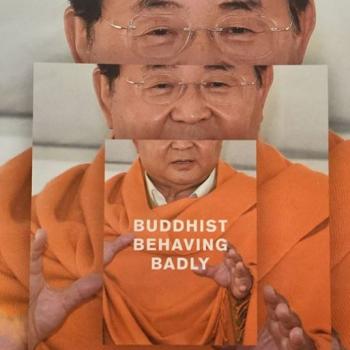Each Sunday here at American Buddhist Perspective, we’ll try to round up a few of the world’s news stories worth knowing about. I have my own (often very limited) perspective, so I welcome yours by way of the comments.
First, not far from where I am now, His Holiness the Dalai Lama will be awarded over $1.6 million tomorrow, only to turn around and donate it all to a yet-to-be-named recipient. I won’t be headed to London to see him though, instead watching, as you can, via live streaming at http://www.templeton.org/. It’s at 1:30pm GMT, which is 8:30am on the East coast.
Next, stepping back a couple weeks, was the International Symposia for Contemplative Studies, held in Denver, CO. Even though it is somewhat old news, the talks are available online, from such greats as Jon Kabab-Zinn, Roshi Joan Halifax, Sharon Salzberg, John Dunne, Matthieu Ricard, and others.
Meanwhile, via PBS I have come across an amazing display of artwork from 19th century Japan, depicting 500 of the Buddha’s close disciples, the 500 arahats (worthy ones) that are said to be with him at various times in the teachings. The artist was Kano Kazunobu (1816-1863) and the paintings are dated to between 1854 and 1863, and they will be on display through July 8, 2012 at the Sackler Gallery in Washington, DC.
Watch Masters of Mercy on PBS. See more from Religion & Ethics NewsWeekly.
Next, to what is probably my favourite newspaper out there, the New York Times (although with their increasingly odious paywall in place, I’m rarely there any more). First, a few ethicists proposed a challenge a few weeks ago: write a convincing short essay on why eating meat is moral. The very challenge seemed to elicit jerking knees from all quarters: “don’t make me ask moral questions about my food!” “You’re justifying meat eating!?” “You’re implying vegetarianism is moral, but…” and even claims of misogyny for having an all-male panel of judges. The last one was the one objection I did agree with. There are plenty of excellent female ethicists that could and should have been included as a judge.
The winning entry is here. It’s by Jay Bost, who teaches at Warren Wilson College in North Carolina and is on his way to a PhD in tropical plant and soil science. His argument is worthy of being read by vegetarians, vegans, ovo-pescetarians, raw foodies, and omnivores alike. In short, he says most meat eating is immoral. In terms of environmental destruction, animal abuse, and personal health, “the system” is broken. That said, there is a place for rearing and eating animals, if done in a truly sustainable manner. He quotes Aldo Leopold’s land ethic: “A thing is right when it tends to preserve the integrity, stability and beauty of the biotic community. It is wrong when it tends otherwise.” In some cases basic grazing of animals is the best way to convert the natural resources into food; much better than using lots of fossil fuels to move soy beans from one distant land to be processed in another to be packaged and shipped to yet another near you.
It’s a fair enough argument, and very well written. But the ‘some cases’ where it works are probably enough to currently feed a few million or perhaps tens of millions of people. The sad irony is that due to our love of meat, most corn and soy grown (in the US at least) is then shipped to processors to ship to factory-farms to fatten animals who will be (sometimes shipped off and) slaughtered, and shipped and shipped and shipped…
The video is a bit dated (2007), but I’m unaware of any changes in practice since then. 2/3 of meat… Yuck. And stories like this abound, from adding water (up to 40%) and other questionable substances (non-chicken animal skin and bone) to chicken breasts to PCBs and food coloring in farmed fish (and environmental destruction) and meat glue… lest I digress.
Yes, for some of us, eating meat is okay, but really – is that what you want to eat?
As for myself. I was a vegetarian (who at fish) from around 200o until 2010. What happened? I moved to India. There, in a country known as a vegetarian’s paradise, I fell somewhat ill, was generally weak, and eventually (with guidance from some good friends) took up meat eating in an effort to regain my stamina. It turned out that I had giardia for at least part of my time there, so diet wasn’t entirely to blame for my lack of energy. Then I ate meat when I was home with my family- in a sense just for simplicity, as they all eat meat- and continued on until about a month ago. In fact the NYTimes article/challenge about the ethics of what we eat was part of what drove me back to my (qualified) vegetarianism.
See, I told you the NYT was my favorite, and this is why.
Two other stories from there revolve around education and consumerism. This Column is Not Sponsored by Anyone, and A Generation Hobbled by the Soaring Cost of College, are two sobering accounts of what is happening in America (and elsewhere) in terms of culture and education.
Of course the commercialization of our society is horrific. When anyone or anything can be bought and sold we are definitely a society that deserves to be in decline. I’ll save a more impassioned plea for another day, but we surely need a more invigorated public sphere and greater public investment in education. Sadly, things seem to be heading in the opposite direction. And as the article shows, when public support is cut, the door is opened to ‘private education’ which has become the source of 25% of America’s student debt while only 11% of total graduates, not to mention claims of unfair advertising and fraud.
This is where I feel like a bit of a ‘conservative’ who wants to go back to ‘the good old days’ when the state funded most of higher education and demanded a relatively high minimum wage. I have spoken with friends and relatives who studied in the 1960s and 1970s for $200 a semester, when the minimum wage was $2.00 (in 1974), meaning a person could pay for a whole year of tuition with a summer job. These days tuition is $5000 a semester on average (at the low end) and minimum wage is $7.25. Do the math.











